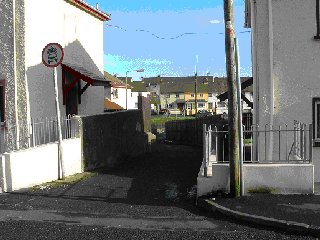As intimated already, the two axles of your ball-bearing buggy had to be flat and not bowed. If they were bowed, the steering didn’t work properly. I remember a number like that, and the frantic and unsuccessful efforts of owners to plane the offending wood back to a level surface!
They had to be a little thicker than the bore of the inner steel band of the ball-bearing. Then the edge would be pared (remember, these were the days before
There had to be a few inches clearance at each side so that, when turning left or right, you didn’t rub your front ball-bearing against the edge of the riding board. Of course, some boards incorporated a rubber door-stopper at just such point of contact, to incorporate a back-up braking system.
The principal braking system was a shoe heel dug determinedly into the ground on either side; though as refinement followed refinement, the incorporation of an advanced braking system became essential. No longer would a swivelling stick at mid-board – that scraped the ground and left a screeching trail – suffice, for any self-respecting buggy manufacturer! More derisory cries of mockery from the onlookers!
There were even connoisseurs who insisted on incorporating a heating system, though I’ll leave it to Theo Patterson on Discussions to elaborate on that point!
The biggest technical problem by far was the insertion of a hole of appropriate bore through the centre of the front axle and the riding board directly above it. No one then owned hand-held drills, much less electrically driven ones. The experienced builder would find a way to gouge out a smaller hole first, that could later be burned and scorched – with the use of a red-hot poker – to the appropriate bore.
Only a novice would attempt to make the hole with a red-hot poker from the start.
So that’s what I did.
Now, in a house with a dozen kids milling around, the carrying of a red-hot poker from the fire in the living-room through the front hall, kitchen and back hall, out to the yard, was not the safest of things to do. Screaming to all and sundry for unhindered passage, I raced out only to find that the poker had cooled to a dull grey and made little or no impact on the board. The only thing burned was my fingers.
Many more such trips were required.
…………. more ‘buggy’ articles to follow ……………
